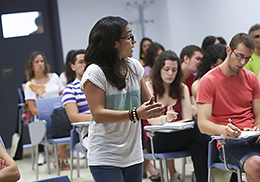-
The UN Committee on the Rights of Persons with Disabilities noted in 2015 a number of problems related to the situation of people with intellectual disabilities in the European Union (http://goo.gl/2HIY3W).
These include the lack of social inclusion. Self-determination of people with intellectual disabilities (in the sector it refers to their ability to make decisions that affect their lives), and social inclusion itself, are interrelated aspects of quality of life that must be strengthened. Despite these efforts, obstacles remain. A very important one has to do with cooperation between families and professional from care centers for people with intellectual disabilities.
The cooperation of these two groups is essential to carry out effective programs for self-determination and social inclusion (Carter et al., 2013). However, as international research shows, there seems to be discrepancies between them. On the one hand, professionals promote more self-determination that families (Zhang, Katsiyannis & Zhang, 2002; Zhang, Wehmeyer & Che, 2005).
Moreover, the processes of bureaucratization and professionalization at the centers increase services and application of expert knowledge, but can obviate processes of social innovation and collaborative process involving vulnerable groups service recipients and their support outside institutions and centers (Alexander, Nank & Stivers, 1999, Ganesh & McAllum, 2012). This project has as a central objective to study the impact of cooperation between professionals and families on the quality of the relationship between these two actors, on the quality of life of people with intellectual disabilities and on welfare professionals themselves and families. It will have the active support of Plena Inclusión as an organization in Spain representing people with intellectual disabilities that brings together nearly 900 entities.
It will be held four types of actions. First, a content analysis of interviews with professionals and families will be held. Second, this information will be used in two sessions of "focus group" for the design of a cooperation program between professionals and families. Third, it will be performed a longitudinal field study with four measurement times. We will examine whether the implementation of the Cooperation Programme, and quality in its execution, influence the evolution over time of the quality of the relationship between professionals and families, the quality of life of people with intellectual disabilities, and welfare professionals and families. Finally, the Project will carry out a transfer process of the Cooperation Program for the sector.









